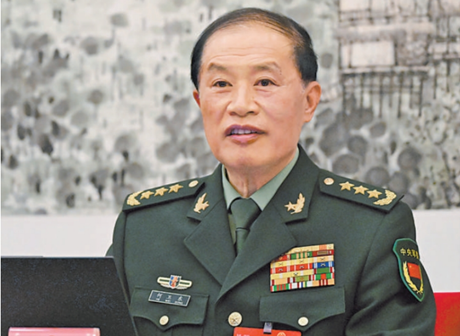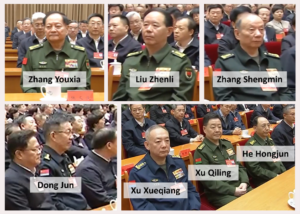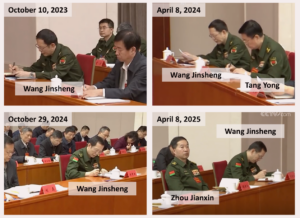
He Weidong’s Possible Downfall and Xi’s Trust Deficit With the PLA
Publication: China Brief Volume: 25 Issue: 7
By:

Executive Summary:
- Central Military Commission Vice Chairman He Weidong’s absence from an important public event, one attended by all Politburo members except him, suggests that he is either seriously ill or under investigation. The latter possibility would suggest that Xi Jinping may have lost confidence in him.
- He Weidong is responsible for overseeing the military’s political and disciplinary affairs, but his personnel management and promotion recommendations since the 20th Party Congress in October 2022 have raised significant issues. Many key generals, upon promotion, were found to have corruption problems.
- He Weidong came up through the Nanjing Military Region, as did recently purged senior officials Tang Yong and Miao Hua. Xi Jinping may view their rise as containing elements of factionalism and cronyism, likely contributing to a loss of trust in He Weidong.
- Xi’s wider distrust is evident in the removal of Li Ganjie from his role overseeing personnel for the Party and government.
- If He Weidong has been purged, the PLA does not have suitable candidates within its ranks to replace him.
As early as March 13, reports began to suggest that He Weidong (何卫东), a vice chairman of the Central Military Commission (CMC), had come under investigation following the big annual political gatherings in Beijing known as the “Two Sessions” (The Epoch Times, March 14). The Financial Times, citing five people familiar with the matter, reported on April 10 confirming He’s removal (Financial Times, April 10). This reporting followed He’s absence from the Central Conference on Work Related to Neighboring Countries (中央周边工作会议), held from April 8–9. This event was attended by all other members of the Politburo, as well as senior three-star generals on the CMC, including CMC Vice Chairman Zhang Youxia, Secretary of the Discipline Inspection Commission Zhang Shengmin (张升民), Minister of National Defense Dong Jun (董军), Director of the Equipment Development Department Xu Xueqiang (许学强), Deputy Chief of the Joint Staff Department Xu Qiling (徐起零), and Deputy Director of the Political Work Department He Hongjun (何宏军) (CCTV, April 9). (See Figure 1).
He Weidong has not made any public appearances since the Two Sessions and has been absent from key events. Although he still appears in the official list of Politburo members on Xinhua’s website and the government has yet to release any related information, his absence raises the possibility that, barring major illness, he is under investigation. Alternatively, as the Financial Times report suggests, He Weidong may have been suspended or removed from his position already (Xinhua, accessed April 10).
Figure 1: Senior Three-Star Generals of the CMC Attend the Central Conference on Work Related to Neighboring Countries

(Source: Compilation by the author based on CCTV video)
Unusual Silence Surrounds Supposedly Loyal He
Two details make the alleged investigation into He Weidong appear unusual. The first is his apparent loyalty to Xi Jinping. The two men have a history of interactions that dates back to Xi’s tenure in Fujian and Zhejiang provinces (Asia Society, October 27, 2022). His loyalty can be inferred from public statements that he has made; specifically from references to the “CMC Chairperson Responsibility System” (军委主席负责制)—a slogan that underscores Xi’s complete control over the military—in remarks delivered at the Two Sessions. He Weidong has used this phrase consistently since he joined the CMC in 2023 (State Council Information Office, November 10, 2021). [1] A review of statements dating back to 2021 shows that CMC members previously removed from the commission, including Miao Hua (苗华) and Li Shangfu (李尚福), did not always mention the “CMC Chairperson Responsibility System.” This sets He apart from many other senior generals on the CMC and demonstrates a high degree of public loyalty to Xi, loyalty that presumably led Xi to trust him enough to promote him to his current position. (See Table 1).
Table 1: Mentions of the Chairman’s Responsibility System by 20th Party Congress CMC Members in Their Two Sessions Speeches.
| Year | 2021 | 2022 | 2023 | 2024 | 2025 |
| Zhang Youxia | X | X | O | O | X |
| He Weidong | Promoted to the CMC at the 20th Party Congress in 2022. | O | O | O | |
| Li Shangfu | X | Announced under investigation on August 31, 2023. | |||
| Liu Zhenli | O | O | X | ||
| Miao Hua | O | X | O | Absent from the 2024 Two Sessions and announced to be under investigation in November 2024. | |
| Zhang Shengmin | O | O | O | O | O |
(Source: Compilation by the author based on Xinhua news report)
The severity of He Weidong’s suspected investigation, which appears to surpass that of Li Shangfu and Miao Hua, is the second unusual detail. For instance, part of Li Shangfu’s investigation took place publicly, including a public call for leads (Lianhe Zaobao, July 29, 2023; Xinhua, June 27, 2024). Miao Hua, despite missing the Two Sessions, reappeared to participate in an annual tree planting event on April 1, 2024, before being suspended later that year. By contrast, silence surrounds He’s case, and he was absent from this year’s tree planting event (PLA Daily, April 2, 2024, April 3). This could indicate that the government either is handling his investigation with a high level secrecy or may not be seeking extensive concrete evidence for its case against him. Miao was placed under “suspension for investigation” (停职检查) rather than being “expelled from the military” (开除军籍) or having their rank revoked (Xinhua, November 28, 2024). It is possible He could face the latter, more serious consequence.
Xi May Have Lost Trust in He
A loss of trust in He Weidong’s ability to manage the People’s Liberation Army (PLA) generals is the primary reason Xi may have removed him. He Weidong’s responsibilities likely include managing political affairs and discipline. [2] However, under his management, the number of PLA generals being investigated or removed for disciplinary violations or otherwise breaking the law since the 20th Party Congress has been high—even after a decade-long anti-corruption campaign within the PLA. Many of the affected generals had been promoted to key positions during He’s tenure, raising concerns about the personnel management and promotion system he oversaw. For instance, Li Zhizhong (李志忠), who was removed as a National People’s Congress (NPC) representative in February 2024, was previously promoted to lieutenant general as the deputy commander of the Central Theater Command in May 2023 (Xinhua, February 27, 2024; HKTKWW, March 4, 2024). Similarly, Li Pengcheng (李鹏程), who lost his position as an NPC representative in December 2024, had been promoted to vice admiral and the commander of the Southern Theater Command Navy in 2024 (NPC, December 25, 2024; RFI, December 25, 2024).
The most serious case may be that of Tang Yong (唐勇), as it could suggest that a “He Weidong” faction was gaining momentum within the military’s disciplinary apparatus. Tang, like He Weidong (and also the recently purged Miao Hua), had served in the Nanjing Military Region (now the Eastern Theater Command) from the 1990s to the 2000s, specifically in the military court. In December 2023, Tang was promoted to lieutenant general and became the Deputy Secretary of the CMC Discipline Inspection Commission. His appointment aroused suspicion due to the unusual treatment of his predecessor, Chen Guoqiang (陈国强). Chen, despite appearing publicly in September 2024 as the political commissar of the National University of Defense Technology (NUDT), remains listed as a member of the Standing Committee of the Central Commission for Discipline Inspection (CCDI). His transfer to NUDT could be seen as a demotion, as his role there was previously held by a major general—a lower rank than Chen’s (Caixin, September 29, 2024). Since Chen has retained his position on the CCDI, he likely has not been found guilty of corruption; however, his reassignment suggests that his superiors may have sought to undermine or punish him. He Weidong may have been the man behind this reassignment. If so, his subsequent promotion of Tang Yong could be seen as an attempt to place a trusted ally in charge of a key position in the military discipline apparatus. This appearance of factionalism and favoritism—whether valid or not—may have caused Xi Jinping to lose trust in He Weidong. The revocation of Tang’s membership to the National Committee of the Chinese People’s Political Consultative Conference, the PRC’s top political advisory body, could be one indication of this (Xinhua, March 26; Lianhe Zaobao, March 27; Mingpao, March 28). Tang has likely been removed from his position, as another lieutenant general, Zhou Jianxin (周建新), recently attended a National Inspection Work Conference (全国巡视工作会议) that Tang previously attended, as shown in Figure 2 (CCTV, April 8).
Figure 2: Recent PLA Senior Generals Attending the National Inspection Work Conference

(Source: Compilation by the author based on CCTV video)
Xi’s Quest for Loyalists Managing Personnel
He Weidong’s current situation remains unknown. However, the hypothesis that Xi Jinping lost trust in He and has placed him under investigation is plausible. It also fits with a broader but related phenomenon, namely, Xi’s low level of confidence in his senior military officers, as evidenced by his willingness to pay attention to the opinions of lower-ranking officers during his participation in the PLA delegation at the Two Sessions, a departure from his previous focus on high-ranking officials (China Brief, March 15). This, in turn, is related to Xi’s growing paranoia beyond the military system.
On April 2, reports surfaced that the former head of the Central Organization Department, Li Ganjie (李干杰), and the former head of the United Front Work Department, Shi Taifeng (石泰峰), were publicly reassigned to each other’s positions (12371, April 2; Xinhua, April 2). This occurred in the context of ongoing corruption issues across the Party and government, which suggests the switch may have been prompted by Li Ganjie’s inability to effectively manage personnel. The announcement on April 8 that Li Gang (李刚), the head of the Central Organization Department’s Discipline Inspection and Supervision Group, is under investigation supports this theory—Li Gang has only been in this role since January 2024 (The Paper, January 30, 2024; People’s Daily, April 8). Disciplinary oversight in the Central Organization Department is an enormously sensitive portfolio, yet it was assigned to someone with a corruption problem under Li Ganjie’s watch. The installation of Shi, a politburo member who served as the vice president of the Party School of the Central Committee from 2007–2010 (when Xi Jinping was its president), likely means that Xi now has a trusted ally in this crucial position (12371, May 22, 2013; Xinhua, October 25, 2017).
The overhaul of officials responsible for personnel changes that has occurred since the 20th Party Congress is connected to Xi’s consolidation of power. During the 18th Party Congress, Xi’s control over personnel was limited. After the 19th Party Congress in 2017, his confidants took key roles, including Chen Xi (陈希) as the head of the Organization Department and Zhang Youxia as the vice-chairman of the Central Military Commission in charge of politics. [3] This may have led Xi to treat them with particular favor. For example, even after Chen stepped down from the Politburo, he continued to serve as president of the Party School. At the same time, Zhang Youxia remains on the Politburo despite being past the conventional retirement age. Zhang has also been unaffected by recent investigations into the equipment development department, which he led from 2012–2017 (Global Times, March 2; SCMP, October 23, 2022). However, it was only after the 20th Party Congress that all members of the Politburo Standing Committee came from Xi Jinping’s faction (China Leadership Monitor, December 1, 2022). Without non-Xi figures such as Li Keqiang (李克强) among the top leadership, Xi likely believed personnel arrangements could be made without resistance, avoiding any compromise that could lead to lingering issues. Therefore, Xi Jinping may view the ongoing personnel management issues within the Party, government, and military systems after the 20th Party Congress as due to what he perceives as incompetence from He Weidong and Li Ganjie. Additionally, He and Li do not share the same special relationship with Xi Jinping as Chen Xi and Zhang Youxia, so Xi could remove them from their posts without concerns about personal ties.
He Weidong’s likely downfall poses a deeper personnel problem for Xi, however. Within the PLA, only Zhang Youxia shares He Weidong’s rank; Miao Hua is under investigation; and Zhang Shengmin does not hold a Central Committee position. No one else would likely have the sufficient rank and experience to take on He’s role and manage PLA personnel effectively.
Notes
[1] This phrase calls for the military to “follow Chairman Xi’s command, be accountable to Chairman Xi, and ensure Chairman Xi’s peace of mind,” and it was even described in an article by Qiushi magazine as a key condition for ensuring the PLA follows the Party’s leadership (Qiushi, December 1, 2022; Xinhua, July 20, 2023).
[2] This is indicated by his public schedule. For example, he has attended events such as a seminar for senior military cadres on the spirit of the 20th Party Congress and an expanded meeting of the CMC Discipline Inspection Committee (Xinhua, December 7, 2022, January 10).
[3] Chen was Xi’s roommate at Tsinghua University, and Zhang Youxia shares close family ties with Xi—both men’s fathers fought together prior to the founding of the PRC (Brookings, September 18, 2017; CPC News, May 26, 2015; SCMP, November 3, 2017).




